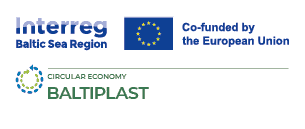
Businesses Unite in Hamburg to Tackle Plastic Waste at BALTIPLAST Event
11 April 2025
Under the title “Reducing Plastic, Enhancing Sustainability: Smart Solutions for Every Business,” on the 2nd of April 2025, the BALTIPLAST project brought together policymakers, sustainability experts, businesses, and NGOs for an insightful afternoon focused on cutting plastic waste without compromising business performance.
Hosted at Forum Finkenau, the event highlighted how companies can stay ahead of tightening regulations, reduce operational costs, and lead in sustainability by implementing circular solutions.
The event opened with remarks from Kevin Langhorst of the Agency for the Environment, Climate, Energy and Agriculture (BUKEA), followed by a presentation of the BALTIPLAST project mission and goals by Andrea Dobri, emphasizing the urgency of addressing single-use plastics (SUPs) in the Baltic Sea Region .
Tools and Tactics to Cut Plastic Use
Central to the afternoon was the demonstration of two innovative tools:
- The BALTIPLAST Inventory Tool: A practical resource that helps companies measure and reduce their use of single-use plastics across operations presented by Johanna Gäbken from Plastikfreie Stadt.
- The BioRADAR Implementation Scorecard: Presented by Estefania Carpio, this tool supports businesses in assessing their contributions to the Sustainable Development Goals (SDGs) across four pillars—environmental, social, economic, and circularity .
Real-World Successes from Lithuania
One of the highlights of the event was the session led by Denisa Martinkutė from ECAT (Environmental Center for Administration and Technology). Titled “Success Stories of Reducing Plastic Waste,” it featured live testimonials from Lithuanian companies that achieved measurable results through BALTIPLAST participation :
- Kaunas Regional Development Agency reduced plastic use by 53%, largely by switching to reusable alternatives in office supplies and hospitality.
- Kaunas Region Waste Management Center cut plastic waste by 40% by eliminating fast-food packaging and promoting personal containers.
- Utenos Vandenys, a water utility, achieved a 22% reduction, focusing on procurement reforms and reusable supplies.
These success stories demonstrate the power of simple changes, cross-team collaboration, and supplier engagement to drive significant environmental impact.
Rethinking Plastics: A Business Opportunity
Johanna Gäbken from Plastikfreie Stadt challenged participants to “unwrap their companies” and rethink plastics as a business opportunity. Her presentation illustrated how tracking plastic usage is a prerequisite to reducing it and how data transparency is key to strategic improvements.
A Community Committed to Change
Attendees also took part in the Sustainability Pledge Wall, where they committed to concrete actions, reinforcing the event’s message that every small step matters. Thanks to the hybrid format, the event reached a wide audience across the Baltic Sea Region.
As businesses continue to adapt to evolving regulations like the EU Single-Use Plastics Directive, Corporate Sustainability Reporting Directive, and Circular Economy Action Plan, events like BALTIPLAST provide the tools, insights, and community support to turn sustainability challenges into opportunities.





